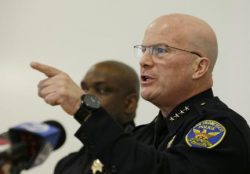
San Francisco — (Press release) THE RACIAL JUSTICE COMMITTEE recognizes the important symbolic step taking place today with Chief Suhr’s resignation. As public servants we know that these decisions are not lightly undertaken.
But as black and brown bodies of unarmed men and women lie in the streets of San Francisco, having been felled by way too many police bullets, we also know that this is only the first step toward building public trust in the City’s administration.
We renew our call, first made on May 3, for a change in police culture, from the top of the command staff to the cadet just making her way through the academy.
It is imperative that every single officer given a uniform, a badge and a gun receive regular and repeated training on how implicit racial bias affects their perception of danger and of who is walking down the street in a suspicious manner.
The Racial Justice Committee renews its call to implement the Ten Point Plan for Police Department Reform, which includes the need for accurate data collection on detentions, traffic stops and so-called consent searches.
People of color across this country are throwing off the yoke of race hatred and the police occupation in their communities, and we demand to be treated as human beings.
Demarris R. Evans Rebecca S. Young
Chair, Racial Justice Committee Co-Chair, Racial Justice Committee
MEMBERS
Yali Correa-Levy
Dana Drusinsky
Tamar Eggers
Cindy Elias
Semuteh Freeman
Everett Hewlett
Herman Holland
Mark Jacobs
Kwixuan Maloof
Rebecca Marcus
Hien Nguyen
Manohar Raju
Haddi Razzaq
Ilona Solomon
Peter Santina
Francisco Ugarte
Jacque Wilson
Zennie Abraham’s note: This is the Ten Point Plan for Police Department Reform:
1. Officers must have a minimum 24 hours of training on implicit bias and its effects, including perspectives of people of color unlawfully detained while walking or driving. Classes must include the impact of implicit bias on officer decision-making in the field. Additionally, officers must participate in periodic cultural competency training and education throughout their career.
2. All Field Training Officers’ performance must be reviewed annually for any documented history of racial bias, excessive force, unlawful search and seizure and false reports, to determine if they are fit to train other officers.
3. The Police Department must make every effort to assign positions in black and brown communities to those officers who live in the communities they are patrolling. The City should provide financial incentives to officers who choose to live in the communities they are policing.
4. All officers, including plainclothes, shall be equipped with body cameras, which must be on and operating while the officer is on duty. A willful failure to turn on the equipment shall subject the officer to disciplinary action. Police officer contact with civilians which is not recorded may be deemed unreasonable by the courts and/or the Office of Citizen Complaints.
5. Whenever a shooting of a civilian by a police officer occurs, an independent investigation shall be conducted by an agency outside the SF Police Department and the SF District Attorney’s Office. Prosecutions of officer-involved shootings shall proceed by way of complaint rather than by grand jury indictment. The Police Department must maintain “use of force” logs to document each instance in which a police officer draws and discharges a firearm whether or not it results in injury. These logs must be made publicly accessible on a reasonable basis, not less than quarterly.
6. A youth representative shall be appointed to the San Francisco Police Commission.
7. Officers shall not detain, search or arrest children at school in the absence of an imminent threat of danger. In the absence of such a threat, the officer’s conduct may be deemed unreasonable by the courts and/or the Office of Citizen Complaints.
9. Officers shall not detain, search or arrest children under 16 in the absence of an imminent threat of danger without having a parent or guardian present. Where such threat has not been established, the officer’s actions may be deemed unreasonable by the courts and/or the Office of Citizen Complaints.
10. Officers who encounter individuals exhibiting mental health issues, or in psychiatric crisis, (unless there is an imminent threat of danger) must contact a supervisor or a member of the Department’s Crisis Intervention Unit before using deadly force or force that may result in serious injury.
SFPD will agree to provide statistics in the form of quarterly reports to the Mayor and the Board of Supervisors on:
1. The number of traffic stops, detentions and stop and frisks of African Americans, Latinos, Asian Americans, Native Americans and Caucasians;
2. Traffic/stops, detentions and stop and frisks of African Americans, Latinos, Asian Americans, Native Americans and Caucasians which did not result in a citation or arrest;
3. Arrests for resisting arrest, or threatening an executive officer (PC 69) and battery on a police officer (PC 243(c)) for African Americans, Latinos, Asian Americans, Native Americans and Caucasians.
The report of each incident shall include the date of police-citizen contact, the ethnicity of the arrestee and the officer(s), the location of the police contact, whether the arrest resulted in the filing of a traffic or criminal complaint and if so, charges alleged by the officer.